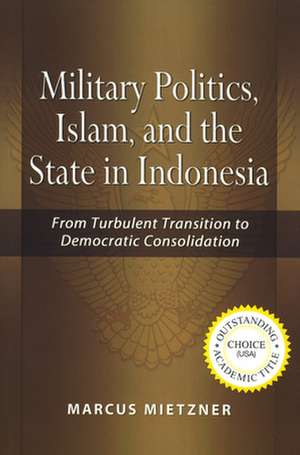Military Politics: Islam and the State in Indonesia: From Turbulent Transition to Democratic Consolidation
Autor Marcus Mietzneren Limba Engleză Paperback – 31 dec 2008
Preț: 409.15 lei
Preț vechi: 481.35 lei
-15% Nou
Puncte Express: 614
Preț estimativ în valută:
78.30€ • 81.45$ • 64.64£
78.30€ • 81.45$ • 64.64£
Carte indisponibilă temporar
Doresc să fiu notificat când acest titlu va fi disponibil:
Se trimite...
Preluare comenzi: 021 569.72.76
Specificații
Cuprins
Preliminary pages
INTRODUCTION
Militaries in Political Transitions: Theories and the Case of Indonesia
PART I: HISTORICAL LEGACIES, 1945-97
1. Doctrine and Power: Legacies of Indonesian Military Politics
2. Islam and the State: Legacies of Civilian Conflict
PART II: CRISIS AND REGIME CHANGE, 1997-98
3. Regime Change: Military Factionalism and Suharto's Fall
4. Divided Against Suharto: Muslim Groups and the 1998 Regime Change
PART III: THE POST-AUTHORITARIAN TRANSITION, 1998-2004
5. Adapting to Democracy: TNI in the Early Post-Authoritarian Polity
6. New Era, Old Divisions: Islamic Politics in the Early Post-Suharto Period
PART IV: DEMOCRATIC CONSOLIDATION, 2004-08
7. Yudhoyono and the Declining Role of State Coercion
8. Stabilizing the Civilian Polity: Muslim Groups in Yudhoyono's Indonesia
CONCLUSION
9. Controlling the Military: Conflict and Governance in Indonesia's Consolidating Democracy
Bibliography
Index
INTRODUCTION
Militaries in Political Transitions: Theories and the Case of Indonesia
PART I: HISTORICAL LEGACIES, 1945-97
1. Doctrine and Power: Legacies of Indonesian Military Politics
2. Islam and the State: Legacies of Civilian Conflict
PART II: CRISIS AND REGIME CHANGE, 1997-98
3. Regime Change: Military Factionalism and Suharto's Fall
4. Divided Against Suharto: Muslim Groups and the 1998 Regime Change
PART III: THE POST-AUTHORITARIAN TRANSITION, 1998-2004
5. Adapting to Democracy: TNI in the Early Post-Authoritarian Polity
6. New Era, Old Divisions: Islamic Politics in the Early Post-Suharto Period
PART IV: DEMOCRATIC CONSOLIDATION, 2004-08
7. Yudhoyono and the Declining Role of State Coercion
8. Stabilizing the Civilian Polity: Muslim Groups in Yudhoyono's Indonesia
CONCLUSION
9. Controlling the Military: Conflict and Governance in Indonesia's Consolidating Democracy
Bibliography
Index
Recenzii
A fine recent book on Indonesia by Marcus Mietzner of the Australian National University highlights five features of the Indonesian armed forces. First is the army's (debatable) view of itself as the main bringer of independence. Second is its disdain for periods of civilian rule in the 1950s, dismissed as chaotic, corrupt and, through the spread of regional rebellions, dangerous to the country's integrity. Out of this disdain grew a third feature, a doctrine known in Indonesia as dwifungsi, or dual function, of running the country as well as defending it, and a fourth, the entrenchment of the armed forces in the infrastructure of the state. The fifth point, what Mr Mietzner terms the 'increasingly sultanistic character' of the ageing Suharto's rule opened up a rift with his fellow generals. When the economy collapsed in 1998 and the threat of anarchy loomed, Suharto looked over his shoulder and found nobody following him. In the end, dictators, however unpopular, despotic and incompetent, rarely fall because they have too many enemies. They fall because they have too few friends left' – The Economist
